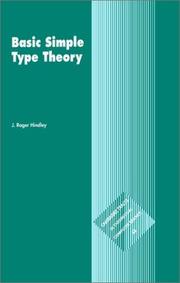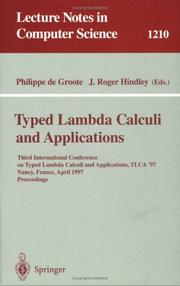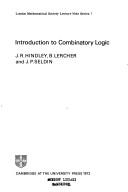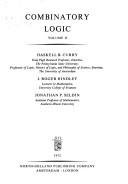| Listing 1 - 8 of 8 |
Sort by
|

ISBN: 9780521054225 0521465184 9780521465182 9780511608865 0521054222 Year: 1997 Volume: 42 Publisher: Cambridge Cambridge University Press
Abstract | Keywords | Export | Availability | Bookmark
 Loading...
Loading...Choose an application
- Reference Manager
- EndNote
- RefWorks (Direct export to RefWorks)
Type theory is one of the most important tools in the design of higher-level programming languages, such as ML. This book introduces and teaches its techniques by focusing on one particularly neat system and studying it in detail. In this way, all the key ideas are covered without getting involved in the complications of more advanced systems, but concentrating rather on the principles that make the theory work in practice. This book takes a type-assignment approach to type theory, and the system considered is the simplest polymorphic one. The author covers all the basic ideas, including the system's relation to propositional logic, and gives a careful treatment of the type-checking algorithm which lies at the heart of every such system. Also featured are two other interesting algorithms that have been buried in inaccessible technical literature. The mathematical presentation is rigorous but clear, making the book at a level which can be used as an introduction to type theory for computer scientists.
Book
ISBN: 0511608861 Year: 1997 Publisher: Cambridge : Cambridge University Press,
Abstract | Keywords | Export | Availability | Bookmark
 Loading...
Loading...Choose an application
- Reference Manager
- EndNote
- RefWorks (Direct export to RefWorks)
Type theory is one of the most important tools in the design of higher-level programming languages, such as ML. This book introduces and teaches its techniques by focusing on one particularly neat system and studying it in detail. In this way, all the key ideas are covered without getting involved in the complications of more advanced systems, but concentrating rather on the principles that make the theory work in practice. This book takes a type-assignment approach to type theory, and the system considered is the simplest polymorphic one. The author covers all the basic ideas, including the system's relation to propositional logic, and gives a careful treatment of the type-checking algorithm which lies at the heart of every such system. Also featured are two other interesting algorithms that have been buried in inaccessible technical literature. The mathematical presentation is rigorous but clear, making the book at a level which can be used as an introduction to type theory for computer scientists.
Programming languages (Electronic computers) --- Type theory.
Book
ISBN: 0521318394 0521268966 9780521318396 Year: 1990 Volume: 1 Publisher: Cambridge Cambridge University Press
Abstract | Keywords | Export | Availability | Bookmark
 Loading...
Loading...Choose an application
- Reference Manager
- EndNote
- RefWorks (Direct export to RefWorks)
Mathematical logic --- Discrete mathematics --- Mathematical logic: computability theory computational logic lambda calculus logic programming mechanical theorem proving model theory proof theoryrecursive function theory--See also {681.3*F11} {681.3*I22} {681.3*I23} --- 681.3*F41 Mathematical logic: computability theory computational logic lambda calculus logic programming mechanical theorem proving model theory proof theoryrecursive function theory--See also {681.3*F11} {681.3*I22} {681.3*I23} --- Combinatory logic --- Lambda calculus --- #KVIV --- 681.3*F41 --- Calculus, Lambda --- Logic, Symbolic and mathematical --- Logic, Combinatory --- Nonclassical mathematical logic --- 681.3*F41 Mathematical logic: computability theory; computational logic; lambda calculus; logic programming; mechanical theorem proving; model theory; proof theory;recursive function theory--See also {681.3*F11}; {681.3*I22}; {681.3*I23} --- Mathematical logic: computability theory; computational logic; lambda calculus; logic programming; mechanical theorem proving; model theory; proof theory;recursive function theory--See also {681.3*F11}; {681.3*I22}; {681.3*I23} --- Combinatory logic. --- Lambda calculus. --- Logique mathématique --- Logique générale --- Logique combinatoire --- Lambda-calculus

ISBN: 3540626883 3540684387 9783540626886 Year: 1997 Volume: 1210 Publisher: Berlin [etc.] : Springer-Verlag,
Abstract | Keywords | Export | Availability | Bookmark
 Loading...
Loading...Choose an application
- Reference Manager
- EndNote
- RefWorks (Direct export to RefWorks)
This book constitutes the refereed proceedings of the Third International Conference on Typed Lambda Calculi and Applications, TLCA '97, held in Nancy, France, in April 1997. The 24 revised full papers presented in the book were carefully selected from a total of 54 submissions. The book reports the main research advances achieved in the area of typed lambda calculi since the predecessor conference, held in 1995, and competently reflects the state of the art in the area.
Lambda calculus --- Congresses. --- Mathematical Theory --- Mathematics --- Physical Sciences & Mathematics --- Congresses --- Calculus, Lambda --- Computer science. --- Computer programming. --- Computers. --- Computer logic. --- Mathematical logic. --- Computer Science. --- Theory of Computation. --- Mathematical Logic and Formal Languages. --- Logics and Meanings of Programs. --- Programming Techniques. --- Mathematical Logic and Foundations. --- Information theory. --- Logic design. --- Logic, Symbolic and mathematical. --- Algebra of logic --- Logic, Universal --- Mathematical logic --- Symbolic and mathematical logic --- Symbolic logic --- Algebra, Abstract --- Metamathematics --- Set theory --- Syllogism --- Design, Logic --- Design of logic systems --- Digital electronics --- Electronic circuit design --- Logic circuits --- Machine theory --- Switching theory --- Communication theory --- Communication --- Cybernetics --- Informatics --- Science --- Computers --- Electronic computer programming --- Electronic data processing --- Electronic digital computers --- Programming (Electronic computers) --- Coding theory --- Computer science logic --- Logic, Symbolic and mathematical --- Automatic computers --- Automatic data processors --- Computer hardware --- Computing machines (Computers) --- Electronic brains --- Electronic calculating-machines --- Electronic computers --- Hardware, Computer --- Computer systems --- Calculators --- Cyberspace --- Programming --- Lambda calculus - Congresses
Book
ISBN: 9780511809835 9780521898850 9780511415562 0511415567 0521898854 0511413297 9780511413292 0511809832 1281751529 9781281751522 9780511412363 0511412363 1107188075 9786611751524 0511414900 0511414234 Year: 2008 Publisher: Cambridge, UK New York Cambridge University Press
Abstract | Keywords | Export | Availability | Bookmark
 Loading...
Loading...Choose an application
- Reference Manager
- EndNote
- RefWorks (Direct export to RefWorks)
Combinatory logic and lambda-calculus, originally devised in the 1920s, have since developed into linguistic tools, especially useful in programming languages. The authors' previous book served as the main reference for introductory courses on lambda-calculus for over 20 years: this version is thoroughly revised and offers an account of the subject with the same authoritative exposition. The grammar and basic properties of both combinatory logic and lambda-calculus are discussed, followed by an introduction to type-theory. Typed and untyped versions of the systems, and their differences, are covered. Lambda-calculus models, which lie behind much of the semantics of programming languages, are also explained in depth. The treatment is as non-technical as possible, with the main ideas emphasized and illustrated by examples. Many exercises are included, from routine to advanced, with solutions to most at the end of the book.
Lambda calculus. --- Combinatory logic. --- Logic, Combinatory --- Logic, Symbolic and mathematical --- Nonclassical mathematical logic --- Calculus, Lambda

ISBN: 0521096979 9780521096973 Year: 1972 Volume: 7 Publisher: Cambridge Cambridge University Press
Abstract | Keywords | Export | Availability | Bookmark
 Loading...
Loading...Choose an application
- Reference Manager
- EndNote
- RefWorks (Direct export to RefWorks)
Mathematical logic --- Discrete mathematics --- Combinatory logic --- Logique combinatoire --- 510.64 --- Logic, Combinatory --- Logic, Symbolic and mathematical --- Nonclassical mathematical logic --- Non-classical, formal systems of logic. Modal logic. Multiple-value logics. Syllogistics. Inductive logic. Probabilistic logic --- 510.64 Non-classical, formal systems of logic. Modal logic. Multiple-value logics. Syllogistics. Inductive logic. Probabilistic logic --- Logique mathématique
Book
Year: 1972 Publisher: Amsterdam North-Holland
Abstract | Keywords | Export | Availability | Bookmark
 Loading...
Loading...Choose an application
- Reference Manager
- EndNote
- RefWorks (Direct export to RefWorks)

ISBN: 0720422086 9780080954776 0080954774 1282309374 9781282309371 9786612309373 6612309377 9780444533876 0444533877 9780720422085 Year: 1972 Publisher: Amsterdam : North-Holland Pub. Co.,
Abstract | Keywords | Export | Availability | Bookmark
 Loading...
Loading...Choose an application
- Reference Manager
- EndNote
- RefWorks (Direct export to RefWorks)
Provability, Computability and Reflection
Mathematical logic --- Combinatory logic. --- Logic, Symbolic and mathematical. --- Combinatory logic --- Logique combinatoire --- ELSEVIER-B EPUB-LIV-FT --- Logique mathématique
| Listing 1 - 8 of 8 |
Sort by
|

 Search
Search Feedback
Feedback About UniCat
About UniCat  Help
Help News
News